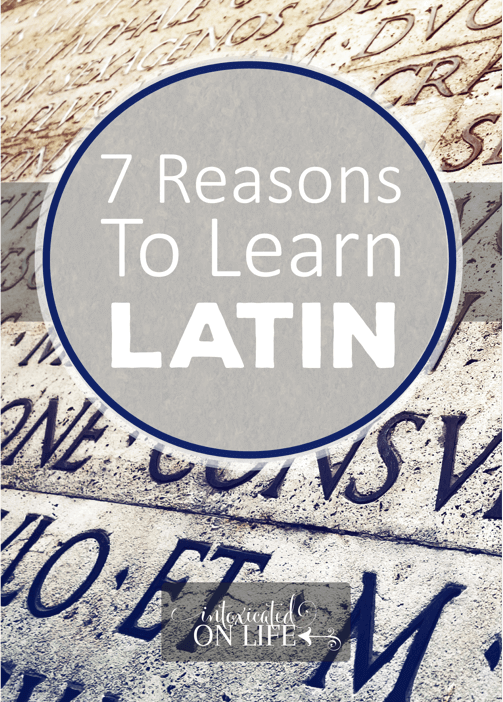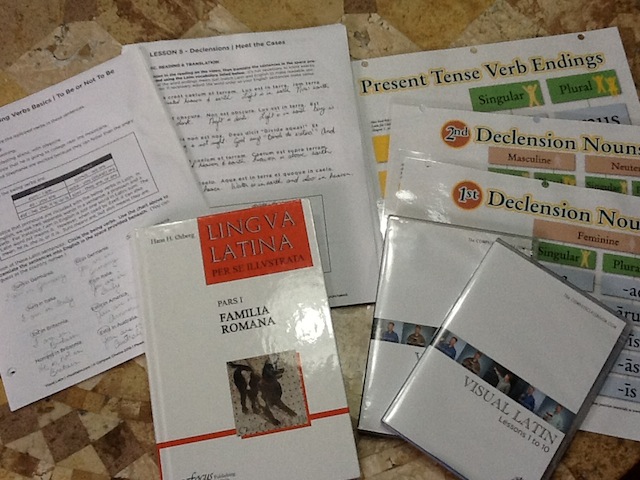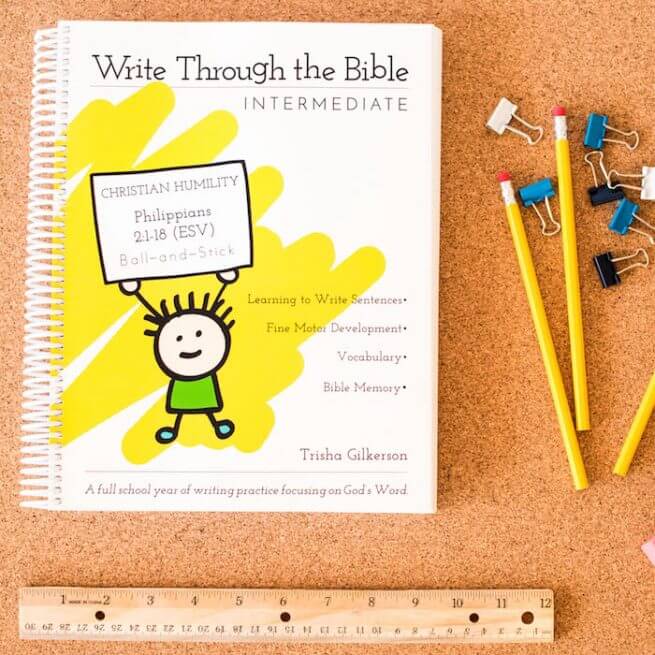I must admit, when I first found out that Classical Education placed a high premium on learning Latin, I balked. No, I was downright turned off by the idea. I have always loved the focus that classical education puts on both memory work and on reading great literature from a young age. But learning Latin? No thanks.
There were a few reasons I spurned the idea of having my kids learn Latin. The first was simply that I knew Latin was a “dead” language. Nobody actually speaks this language anymore. What possible use could learning a dead language be?
The second (and I’m ashamed to say, most important reason) was that I find learning languages to be dreadfully difficult and I knew if I wanted my children to learn this language I’d have to trudge through the mess of it myself too (this excuse = intellectual laziness).
Like the information addict that I am, I had to do some reading about why so many leaders in the classical sphere insisted learning Latin was imperative. So below, for your reading pleasure, I’ve listed the reasons that convinced this language-phobic Mom to add Latin to our school schedule (with the help of Dwane Thomas and Visual Latin as well as our homeschool co-op).
7 Reasons We Are Learning Latin
- English Vocabulary – Learning Latin improves your vocabulary and helps you understand the English language. Did you know that approximately 60% of all English words derive from Latin, and that 90% of English words with more than 2 syllables have a Latin root! Just a few weeks ago, I had a conversation that referenced octuplets. Bradley, my 8-year-old, said “Wow! That’s a lot of babies Mom.” I asked him, “Do you know how many babies that is?” And he responded, “Yeah, 8.” I said, “How do you know that?” And he casually stated, “You know octo in Latin is 8, Mom.” Sweet, at just 8 years old, learning Latin is already helping my child with his English vocabulary!
- Foreign Languages – Having a grasp of Latin aids in learning other languages. After learning Latin, learning any other language will be easier, but especially the romance languages. Spanish, French, Italian, Portugese, and Romanian are all romance languages, and these languages derive more than 80% of words from Latin and their grammatical structure is similar to that of Latin.
- English Grammar – Many argue learning Latin grammar, which is organized better than English grammar, gives a student a superior understanding of the English language, even more than studying the English language does.
- Increase Standardized Test Scores – A student’s verbal, analytic, and problem solving scores all increase after studying Latin. A profile of SAT scores was completed recently which shows Latin students as compared to those learning French, Spanish, German, and Hebrew. The Latin students surpassed the test scores of every other group. This study showed that this trend did not just happen in one year. In all seven years of the study, they observed Latin students outperformed others students.
- Key to the Past – Students have access to ancient scholars when they become proficient in Latin. You are able to examine many classical pieces of influential literature in their original language.
- Foundation of Sciences, Logic, Theology, and Law – Latin provides many root words for the modern sciences, and is the language of law, politics, logic, and theology. While it is true that a large number of scientific terms come from Greek as well, all legal terms come from Latin. The study of logic also comes to us from Latin translations of Aristotle’s work from the Middle Ages. And in the West, theology was filtered through the Latin language, providing Christians with a rich and malleable language to discuss divine concepts.
- Intellectual Discipline – Latin is systematic and precise. Learning Lating demands intellectual discipline. The influential author and academic Dorothy Sayers pronounced,
I will say at once, quite firmly, that the best grounding for education is the Latin grammar. I say this not because Latin is traditional and medieval, but simply because even a rudimentary knowledge of Latin cuts down the labor and pains of learning almost any other subject by at least 50 percent.
These are the reasons I begrudgingly decided to begin teaching Latin to my son and learning a bit of Latin myself. You know what? It’s not been half bad! Admittedly, my brain does hurt sometimes as I study Latin, but I’ve actually enjoyed learning Latin and the challenge that Latin presents.
In college, I took the obligatory 2 semesters of a foreign language and managed to painstakingly eek out an A- in both classes. Unlike my college French experience, I don’t feel under pressure and I have been able to take a nice leisurely pace learning Latin. I’ve also really enjoyed the video curriculum we began using last year. The teacher has a great sense of humor and offers up the lessons in nice bite-sized chunks.
Check out my review of Visual Latin, or just simply check out the Visual Latin wesbsite if you’re interested in finding an easy to implement Latin curriculum for the language-phobic.
Here’s Dwane (the Visual Latin teacher) giving his reasons why Latin is cool. (This also gives you a taste of his teaching style, if you are looking to buy a good Latin curriculum.)
Here’s my oldest son giving his endorsement (when he was 8 years old).
More Resources on Learning Latin and/or Homeschooling:
- 10 Free Latin Resources to Keep Learning Fun
- Easy-to-Implement Latin Curriculum: Visual Latin (Review)
- Hate Grammar? This Curriculum Makes It Easy
- Stop the Homeschooling Chaos: Practical Strategies for Independent Learning












I felt the same apprehension as you did at learning Latin. I didn’t do so well in high school level French, and college wasn’t in the plan for me. Languages are NOT my forte. I’m so glad you’ve found a system that works so well for you!! Having the right curriculum I think works wonders when you’re teaching something that makes you yourself nervous.
You’re right, the right curriculum can make all the difference! Thanks for stopping by 🙂
I’m going to have to share this with my husband. He feels the same way you did. We have not started Latin yet, but might start slowly next year. Thank you for linking up with Trivium Tuesdays! I look forward to perusing you blog =)
Thanks for checking us out! Glad you found the post helpful. We started Latin slowly too, but really picked up the pace this past year and that’s made it even more fun. If you decide o start Latin, I hope you and your family have fun with it!
Thanks for the helpful review/info. Are the worksheets and noun ending and declension charts also from the Visual Latin Program you’re enjoying?
Thank you.
Steven
The worksheets are provided as free downloads from visual Latin. I found the charts at classical academic press as a free download. I printed and laminated the charts, they’ve been nice to have around.
Thank you SO much!
Thank you!
We haven’t done very well on studying Latin ourselves, but it’s in the “plan,” I promise! My oldest studies Latin and Greek roots, but we haven’t been able to stick to a formal Latin program just yet. Planning on it for high school with an immersion set my uncle (who teaches Latin in a ps high school) was kind enough to give to us several years ago. I know it will be good for them (and me)!
We are ALL learning Latin right now. We started Classical Conversations this year with my oldest who just turned 5 in January. We’re memorizing the declensions right now, and I’m grateful for us doing it this early.
Marvellous post! My husband and I both feel that if you speak or read English, knowing Latin brings a huge enrichment to the experience (never mind the improved SAT scores, this is all about pleasure!) and are happy to see that our local high school offers Latin (which, gratifyingly, is apparently always over-subscribed). You may be interested in “Ad Infinitum: A Biography of Latin” by Nick Ostler, a professor of linguistics at the Univ. Bath who also wrote the riveting “Empires of the Word: A Language History of the World”.
Enjoy your journey: when you are ready, make sure to read Winnie the Pooh, Peter Rabbit, and the Asterix & Obelix comics, all available in Latin.
Great to know! I really appreciate the suggestions. We’ve worked our way through the first several chapters of Lingua Latina. It’s been fun to feel like we’re actually reading something more than a paragraph or two 🙂
Harrius Potter et Philosophi Lapis is an interesting goal as well.
Lighter reading (which might be in your grasp after the first few chapters of LLPSI), is Ritchie’s Fabulae Faciles, which I believe is available online for free.
Thanks for these resources!
I have been eyeing up.visual Latin for my son. I just purchased Michael Clay Thompson’s curriculum for next year’s ELA, which is also heavy with a Latin emphasis, so I dint know if it would be overkill to do both Visual Latin and MCT.
I don’t know anything about Michael Clay Thompson’s curriculum, so unfortunately I can’t speak to whether they would compliment each other or if it would be overkill. You can always go through the first few lessons for free online and see what you think before purchasing though!
Wow. Do you know me?! Because you described Latin and I perfectly.
Have you been learning with your child? How’s it going?
Hahaha…..technically yes. We’ve been doing Latin for about 1.5 years. My husband and I both like the classical style of educating and he wants Latin taught…..which means I have to do it. 🙂 I was fine NOT good at learning Spanish when I was in school, so I wasn’t thrilled with teaching a language. 🙂 I submitted though and even got a little excited about it! But because I wasnt 100% on board/excited, we haven’t made much progress. Sigh. We are still plugging away at it though and I’ve renewed my commitment to teaching it. We are using the Veritas Press books right now I like how teachable it is for me. 🙂
Yes, it’s been difficult for me too. Thankfully, we have a fantastic Latin teacher at our homeschool group that meets on Mondays, so my two older boys get some great instruction “in person.” I’m using Song-School Latin with my 1st grader and using Visual Latin with my 5th grader. We’ve surpassed the point at which I can even pretend to “teach” Latin, so this easy to use video curriculum has been great for us!
We decided not to learn Latin. Your 7 reasons are perfectly sound and I’d never try to dissuade anyone away from teaching it. That said, truly stellar education can be achieved without Latin, a truism not widely voiced. My counter-perspectives on Latin are as follows: 1. English vocabulary. It is true Latin improves vocabulary. What is not known is how that compares to non-Latin students who read, read, read. I suspect the outcome is roughly the same. Given that, I’d rather be well read than Latin proficient. 2) Latin is the root of the Romance languages. Again, no argument. However, you get much of that cross-language boon by learning any of the romance languages plus the benefit of mastering a living language. 3) Intense study of English grammar is good enough for 99% of all purposes. Latin study to improve English grammar just seems like overkill. 4) Increased Standardized scores. I think it is very safe to assume that non-Latin students who work hard and have invested parents (both required for proficient study of Latin) also perform better on Standardized Tests, on average. 5) Key to the past. In this day and age of the internet and a plethora of really good translations to compare and contrast, reading something in its native language just isn’t that critical. Unless, of course, you plan to be an expert in those areas, which is less than 1% of all students. 6) Foundation of Sciences, Logic, Theology, and Law. Once this was insurmountable. Newton’s papers were written in Latin. Classes were taught in Latin. It was THE language of science. That simply is no longer the case. You can go as far as you want in any of these fields with simply a layman’s knowledge of Latin. In the study of theology it is perhaps a little more critical but again, given how much is very expertly translated and readily available, unless you plan on being a priest or doctoral level theologian, is simply is not that critical. 7) Intellectual discipline. Math and hard science are just as demanding if no more so. However, they are so intimidating to so many that rigorous levels of instruction are lacking. Make up for that deficiency and the added benefit from Latin evaporates. Again, I’ve no problem with Latin instruction but it is not the be-all-and-end-all to an outstanding education, which can be achieved with it.
I completely agree, one can have a rigorous education without learning Latin. I certainly don’t think that it’s the end-all-be-all to an outstanding education, but I do think that it can be an important component.
I also agree with a lot of your points. I didn’t learn anything about Latin, yet did very well in school and went on to receive both my Bachelors and Masters degrees (and probably would have gone on to get my Ph.D had I not started having babies) :). I did very well in school with no Latin background.
After receiving my education though, and knowing what I know now, I do wish I would have had at least some Latin education before entering college. I believe it would have sharpened my mind and I KNOW it would have made a number of classes much easier – particularly my science classes (I was pre-med and have a bachelors in biology).
That is a great list of reasons to study. We are studying Latin here. My husband recently flew FinnAir from England to Asia and said that Latin was one of the options for the movies. Maybe we need to fly FinnAir so we can use our Latin.
Wow! I didn’t even realize they made movies in Latin. How fun is that 🙂
Has anyone used “The Latin Road to English Grammar?”
I have tried LRtEG and three out of my four children, the three sons of mine, balked at all the copywork. I don’t think that program really taught English grammar that well either. For English grammar we opted for one year of Shurley Grammar, a year and a half of Harvey’s, and lots of diagramming using Mary Daly’s book. We settled on Memoria Press’ First Form series for beginning Latin and Henle’s for advanced Latin. The two intensive studies in grammar complimented each other and made for really strong knowledge and ability in language.
I took 4 years of Latin in high school and loved it. Part of the reason was the personality and teaching method of Magister Graham. I can still picture him explaining the different words for ‘kiss’. I kept the text book and find reasons to reference it. Latin was a blessing when learning anatomy.
I am a voracious reader and Latin has been useful.
A great teacher can make all the difference! I sure wish I had Latin prior to taking anatomy in college. It would have made it SO much easier! Thanks so much for sharing about your latin experiences 🙂
I loved this article! My sister and I both took two years of Latin – she was in 7th grade and I was in 4th I think (homeschool years meld together). I am so thankfully I took it! It made the etymology courses I took in high school (highly recommended) way easier. I have had a very successful education – I had a master’s before I turned 22, and so much of that I can contribute to Latin and etymology. i can read difficult words and easily break them up. Please continue encouraging your kids to learn Latin!
Thank you for your comment. Great to hear how Latin has benefited others!
Thank you for appreciating Latin – when my son was entering high school, I urged him to take Latin and told him he would thank me later. When he scored a perfect 36 in English on his ACT, he DID thank me and said – Mom, you were right – most words have a Latin root.
On a personal note, I took Latin in grade school and went on to excel at English, French, and German!
Wow, thank you for sharing how much Latin helped your son! That should certainly encourage some students (and parents) 🙂
Great article! I just finished reading The Classical Education guide for Homeschooling the other day and had the same reaction you did to learning Latin. Then, I stopped and thought about how much Latin my son is already exposed to on a daily basis. He’s obsessed with Dinosaurs and the majority of those names are built on Latin words, so… Latin Learning here we come I suppose.
I wonder if these same points apply to learning Greek? I know a little bit of Greek and Spanish. And I loved learning French, still remember most of it too. I am planning to teach my kid Spanish when she’s older, but I never even thought of Latin. I know a little bit of Latin from being a voracious reader who read etymology books for fun when I was younger, and it came in handy when I was learning medical transcription, but I was mostly learning it as English, not as the language itself. Though I do have some Latin phrases memorized, which are mostly useless.
For the truly UNRESERVED (Deuteronomy 4-6; Matthew 22; Mark 12; Luke 10) SERIOUS Christian (sadly how few there are), learning Latin is truly CRUCIAL in view of the simply HUGE amount of the Church’s past works (e.g. writings of the Church Fathers) are STILL (even in 2017!) UNTRANSLATED, not to mention the nuances some of the existing translations can miss (nobody’s perfect). Martin Luther’s great De Servo Arbitrio (Bondage of the Will) was originally written in Latin, and it’s obvious from the English translation I have that this translation has significant (even if not insurmountable) problems that can only be resolved by consulting and understanding the original. It’s ironic that the supposedly “inferior” Latin Vulgate of 404 AD, (sadly despised by so many questionably acclaimed “bible scholars” who so easily fool the gullible) is actually sometimes SUPERIOR to modern 20th-21st English translations in translating the original in places like Romans 6:7.